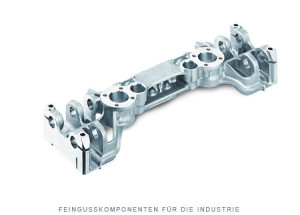 In order to expand its global aerospace business, Alcoa will acquire privately held TITAL. Lightweight, high-performance metals leader Alcoa will strengthen its global position to capture increasing demand for advanced jet engine components made of titanium.
In order to expand its global aerospace business, Alcoa will acquire privately held TITAL. Lightweight, high-performance metals leader Alcoa will strengthen its global position to capture increasing demand for advanced jet engine components made of titanium.
Germany-based TITAL is a leader in titanium and aluminum structural castings for aircraft engines and airframes. Its revenues from titanium are expected to increase by 70 percent over the next five years as manufacturers of next-generation jet engines look to titanium solutions for engine structural components. Titanium can withstand extreme high heat and pressure, and is a lighter weight alternative to steel, providing increased energy efficiency and improved performance. These engines are used on large commercial aircraft, including wide- and narrow-body airplanes. Engines for narrow-body aircraft are among the top selling jet engines in the world.
“This acquisition is the next step in building a powerful aerospace growth engine,” said Klaus Kleinfeld, Alcoa Chairman and Chief Executive Officer. “As a fast-growing innovator, TITAL will increase our share of highly differentiated content on the world’s best-selling jet engines. The company’s talent and customer relationships will boost Alcoa’s expanding global aerospace leadership as we meet the future needs of our customers. We have the highest respect for our future colleagues and look forward to welcoming them wholeheartedly into the global Alcoa family.”
Philipp Schack, CEO of TITAL said, “Alcoa is widely recognized for its innovation and manufacturing expertise, which is fully in line with TITAL’s philosophy. We look forward to joining the Alcoa family, and to combining our world-class technologies and processes. Alcoa was and is our desired partner. We are glad to join this impressive company at an exciting time.”
This transaction will further position Alcoa to capitalize on strong growth in the commercial aerospace sector. Alcoa projects a compounded annual commercial jet growth rate of 7 percent through 2019 and sees a current 9-year production order book at 2013 delivery rates. Almost 70 percent of TITAL’s revenues are expected to come from commercial aerospace sales in 2019. In 2013, the company generated revenues of approximately €71 million (US$96 million), more than half of which came from titanium products.
The acquisition will establish titanium casting capabilities in Europe for Alcoa, while expanding its aluminum casting capacity. TITAL’s strong connections to European engine and aircraft manufacturers such as Airbus, SNECMA, and Rolls-Royce, will enhance Alcoa’s customer relationships in the region, and beyond.
TITAL’s engineers are known and highly respected experts in manufacturing advanced, single-piece components, often delivered ready for the customer to install, which lower weight and reduce complexity. These products, such as engine gearboxes, nacelles and fan frames, are used on current and next-generation jet engines and airframes. TITAL will add capabilities in casting titanium airframe structures, such as titanium castings for pylons. Pylons mount engines onto airframes and are a highly-engineered part because they must bear the load of the engine and its thrust.
In addition, TITAL is a leader in process technology. It employs advanced techniques needed to manage titanium’s reactive properties, including cold hearth melting and centrifugal and gravity casting. Its teams also use 3D-printed prototypes, enabling customers to test designs and bring a finished product to market faster. TITAL employs more than 650 people, primarily in Bestwig, Germany.
The transaction, which has been approved by the Boards of Directors of both companies, remains subject to customary closing conditions and receipt of required regulatory approvals. Alcoa expects to obtain all required regulatory clearances and close the transaction in the first quarter of 2015. Financial details of the transaction were not disclosed.



